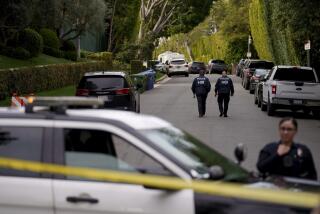Drug Charges Peril Chicago Gang Verdicts : Crime: Alleged narcotics use by informants in government offices probed. A number of El Rukn convictions could be scuttled.
- Share via
CHICAGO — A federal district judge took the rare step Monday of appointing a former U.S. attorney to question government prosecutors about allegations of drug use and sexual contacts by informants inside government offices. The charges threaten to scuttle scores of narcotics convictions lodged in recent years against the El Rukns, Chicago’s largest and most feared street gang.
During a hearing Monday to look into the government’s dealings with its El Rukn informants, U.S. District Judge Marvin E. Aspen said he had asked Thomas Sullivan, a former U.S. attorney here, to question several federal prosecutors and other witnesses because of his knowledge about “how the U.S. attorney’s office operates.”
According to a source involved in the proceedings, the judge wanted Sullivan’s involvement for three possibilities: the prospect of new trials if some drug cases are declared mistrials, the possibility that some guilty pleas might be overturned and the prospect that some lawyers--perhaps prosecutors--might be charged with misconduct.
Ronald J. Clark, a defense attorney who represents one El Rukn client, said Monday that “almost all” of the government’s cases could be endangered if any prosecutorial misconduct were proved. “There’s a lot at stake here,” Clark said outside the hearing room.
In all, 65 El Rukn defendants have been charged with a variety of crimes over the last three years. More than 40 have been tried, with 15 pleading guilty and nearly that number convicted.
The most recent allegations to rock the government’s massive campaign against the El Rukns were detailed Monday by a federal witness. The witness, Harry (Brock) Martin, claimed that two assistant prosecutors were aware of complaints that other witnesses had smuggled cocaine into their prison cells and that sometimes they had sex with wives and girlfriends inside the U.S. attorney’s office in downtown Chicago.
Martin, a career criminal who is now under federal witness protection, testified that he told Assistant U.S. Attys. William R. Hogan Jr. and Kristina Anderson about drug use by other federal witnesses at the Metropolitan Correction Center, a federal jail facility in downtown Chicago.
Martin also said that another witness, Henry Leon Harris, a former El Rukn “general” who is under federal protection, claimed that he concocted testimony with Hogan, the chief prosecutor in the El Rukns cases.
The two prosecutors both strenuously denied the allegations under questioning by Sullivan and other lawyers.
A square-jawed, 10-year veteran prosecutor in Seattle and Chicago, Hogan has headed up the campaign to wipe out the El Rukns. His success in prosecuting conspiracy and drug counts against dozens of violent El Rukns led former Atty. Gen. William P. Barr to send him to Los Angeles for five months last year to help initiate and structure drug prosecutions of Crips and Blood street gang members.
The El Rukns evolved from a Southside Chicago street gang into a formidable drug empire that held sway over much of the city through the mid-1980s.
More to Read
Sign up for Essential California
The most important California stories and recommendations in your inbox every morning.
You may occasionally receive promotional content from the Los Angeles Times.













